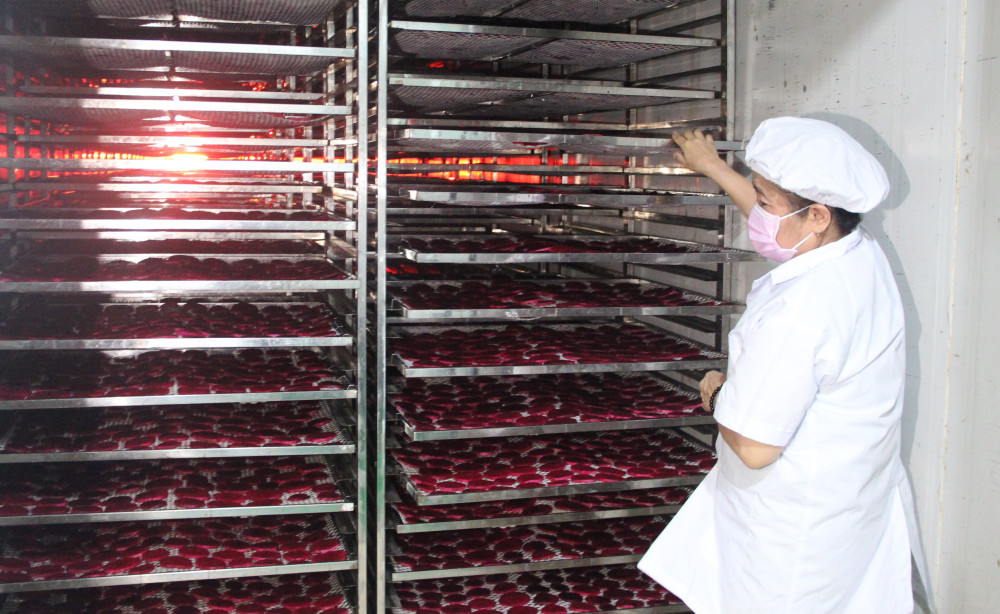
Workers of HG Food Joint Stock Company (My An commune) put dragon fruit slices into the drying oven, ensuring a safe and closed processing process
Standardizing quality from VietGAP and organic fields
According to the Department of Agriculture and Environment, up to now, the whole province has supported 221 safe agricultural production facilities, of which 3,376 hectares have been certified by VietGAP, 509 hectares by GlobalGAP, and 32 hectares by organic standards, showing that clean agriculture is gradually becoming the mainstream trend.
In Tan Long commune, the VietGAP rice model of Long Thuan Agricultural Cooperative has become a bright spot. Mr. Le Minh Truc, a member of the cooperative, shared, "Thanks to applying the VietGAP process, we have reduced the amount of fertilizers and pesticides, yet the yield is still stable, and the selling price is 10-15% higher. Consumers trust it, making farmers feel secure in production."
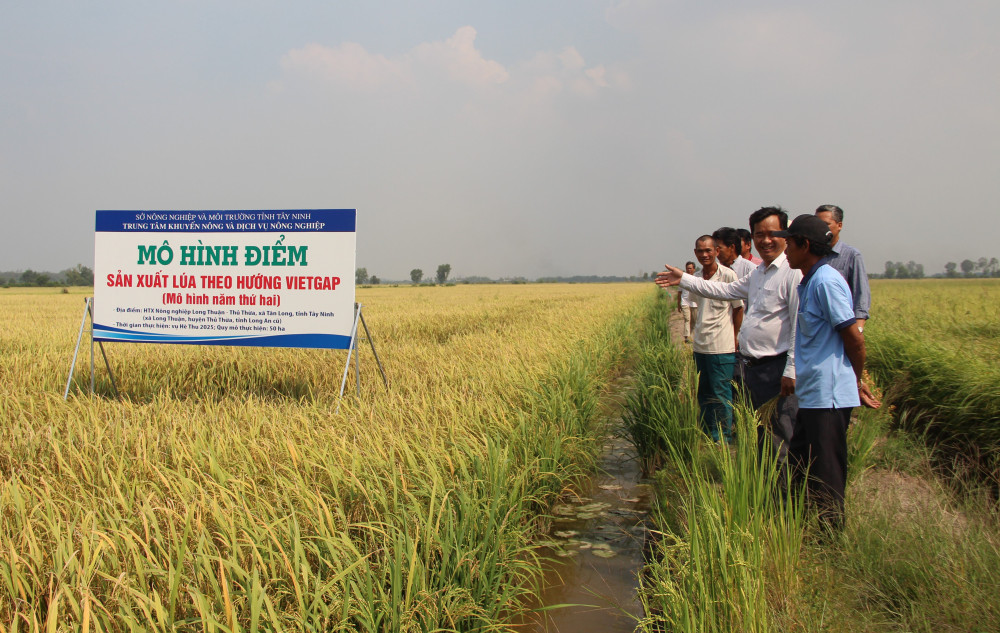
Farmers in Tan Long commune grow rice according to VietGAP process—towards safe and sustainable production
In dragon fruit growing areas of Tam Vu, An Luc Long, Thuan My, most farmers are familiar with the VietGAP process. However, to increase value and expand the market, many households have switched to organic production standards, meeting the requirements of enterprises exporting to Japan and the EU. Thanks to propaganda, the awareness of farmers has been increasingly raised, product quality has improved significantly, and economic efficiency is more sustainable.
Mr. Tran Hong Cuong (Long Hung hamlet, An Luc Long commune) has been involved in organic agriculture for more than a decade. From the early days of hesitation, he has built a 3-stage roadmap and perfected the process.
“The most difficult thing is not the technique but the market, but over the past 12 years, organic dragon fruit has shown clear effectiveness; the trees are healthier and have fewer pests and diseases, thanks to the use of antagonistic microorganisms, reducing dependence on chemical pesticides,” Mr. Cuong confided.
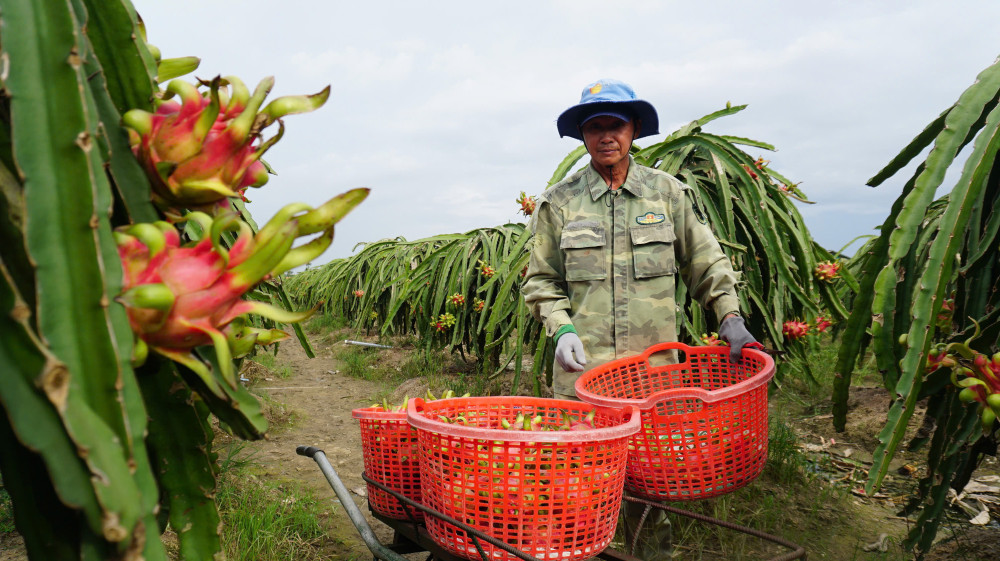
Mr. Tran Hong Cuong (An Luc Long commune) and his the organic dragon fruit garden—a pioneer model that has maintained export standards for more than 10 years
He said that to convert to organic production, it takes at least 6 months to 1 year for the trees to adapt. Growers can start alternating organic fertilizers, gradually reducing chemical fertilizers. When going in the right direction, the trees will grow sustainably and have fewer diseases, stable productivity, and favorable output.
Not only stopping at rice or dragon fruit, many cooperatives in the province have boldly converted the production of vegetables, fruit trees and industrial crops in a safe direction, with clear traceability. For example, Phuoc Hoa Safe Vegetable Cooperative (Long Cang commune) has developed a clean vegetable chain according to VietGAP standards, supplying supermarkets and collective kitchens in the province.
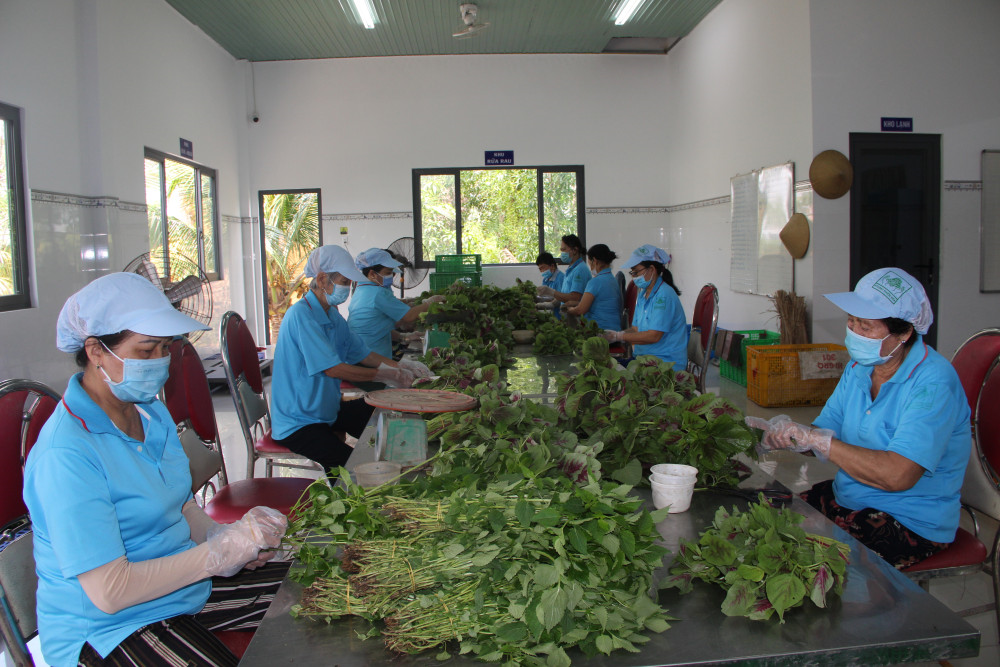
Workers of Phuoc Hoa Safe Vegetable Cooperative (Long Cang commune) process vegetables before delivering them to customers
Director of Phuoc Hoa Safe Vegetable Cooperative Kieu Anh Dung said, “We determined that safe production is a long-term path. Initially, people were afraid of the strict control process, but when they saw that vegetables sold at higher prices and had stable output, everyone agreed. The cooperative also invested in a net house system, automatic irrigation, and electronic diary recording for easy traceability. Now, every bunch of vegetables leaving the garden has a clear origin and source.”
Meanwhile, the Viet 78 Coconut Agricultural Service Cooperative (Tan Bien commune), founded by Mr. Nguyen Van Tien, has become a model in linking organic production with stable consumption. Established in April 2019, Viet 78 Coconut Cooperative aims for a sustainable production and business model. In addition to his family's 15 hectares, Mr. Tien has cooperated with many households, increasing the total organic coconut area of the cooperative to nearly 300 hectares. "Even when the price of coconut in the West has dropped sharply, the cooperative still purchases stably, accepting low profits to maintain its connection with farmers. Sometimes traders stop buying green Siamese coconuts, yet the Cooperative still buys them so that people can feel secure in production," Mr. Tien shared.
Promoting deep processing, expanding the value chain
.png)
Workers of HG Food Joint Stock Company (My An commune) pre-process and prepare to dry dragon fruit using modern technology, ensuring to preserve the natural flavor
If "safe raw material area" is the foundation, "deep processing" is the breakthrough to help Tay Ninh agricultural products go further. In the province, many enterprises have invested in modern processing factories, linked to the value chain from production to consumption. Typical examples are HG Food Joint Stock Company (My An commune) with a line of drying dragon fruit, jackfruit, mango using drying technology to preserve the natural color and flavor, and VinaGrin Import Export Company Limited (An Luc Long commune) specializing in processing dried agricultural products and packaged products for export to Japan and the EU.
Director of HG Food Joint Stock Company Duong Thi Truc Giang shared, “To process sustainably, the raw material area must be safe. We sign long-term contracts with farmers, require VietGAP production processes, and support packaging, traceability stamps and standard harvesting techniques. When the raw materials are clean, the finished products will be qualified to enter supermarkets and be exported. Businesses and farmers will benefit together.”
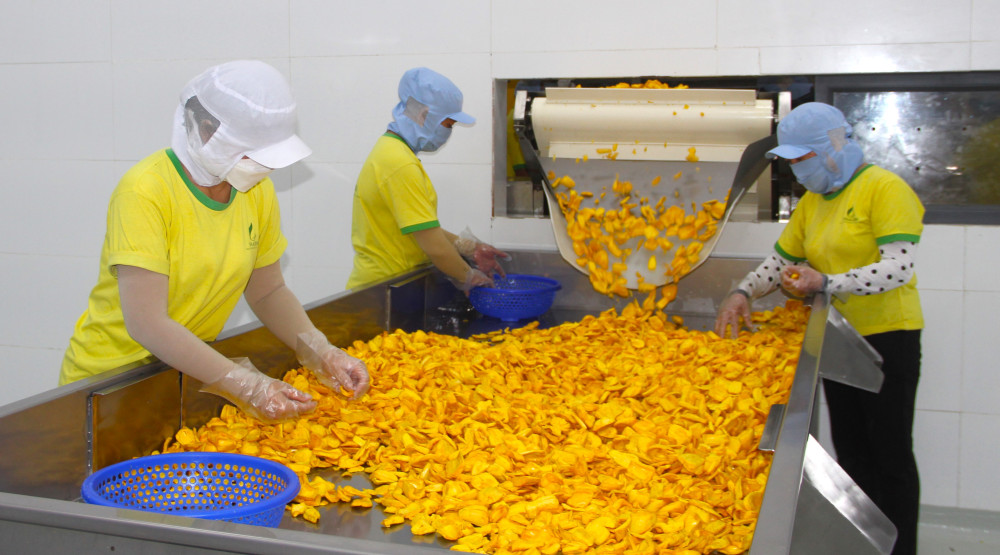
Jackfruit drying line at the factory of VinaGrin Import Export Company Limited (An Luc Long commune), helping to increase the value and diversify Tay Ninh agricultural products
According to the Department of Agriculture and Environment, up to now, the whole province has been granted 415 growing area codes (16,731 hectares) and 179 packaging facility codes for export to Japan, Korea, the US, Australia, New Zealand, and the EU. More than 130 agricultural processing facilities meet advanced quality management standards such as HACCP, ISO 22000, HALAL, and BRC, contributing to increasing the added value and competitiveness of products.
The "One Commune One Product" (OCOP) program also made a strong impression with 392 OCOP products, including 1 5-star, 73 4-star, and 318 3-star products, with 11 commercial display points. These numbers not only demonstrate the vitality of local agricultural products but also contribute to promoting Vietnamese goods, boosting domestic consumption and exports.
In particular, Tay Ninh's agricultural sector has applied digital technology in product management and consumption, supporting 3.24 million QR stamps to trace the origin for 42 enterprises and cooperatives, helping consumers feel secure, and affirming the prestige of Tay Ninh agricultural product brands.
Deputy Director of the Department of Agriculture and Environment Truong Tan Dat said, “In the context of deep and wide integration, if we only stop at raw material production, the value of agricultural products will be very low and easily lost due to market fluctuations. Therefore, the province identifies deep processing and value chain linkage as an inevitable direction to improve competitiveness. We encourage businesses to invest in modern technology while supporting farmers to join cooperatives, sign long-term consumption contracts, and ensure stable input and output. In addition, the agricultural sector also focuses on digitizing management processes, tracing origins, and developing OCOP product brands associated with local tourism and culture. The ultimate goal is to form a green, clean, and sustainable agriculture, where Tay Ninh products not only meet the domestic market but are also strong enough to conquer demanding markets in the world.”
From fields to factories, from traceability stamps to OCOP products, Tay Ninh is proving that safety is not only a standard but also a commitment to consumers and a sustainable agricultural future. Each field and each processing facility is a link in a closed value chain—where farmers, businesses and the government share the same aspiration to build a Tay Ninh agricultural brand that reaches the international level./.
By Bui Tung - Translated by Q. Thien
Source: https://baolongan.vn/an-toan-tu-san-xuat-den-che-bien-a205756.html
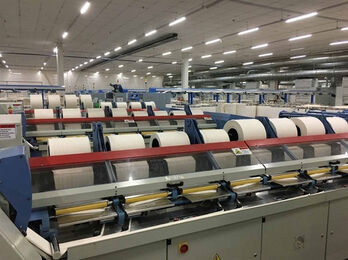 Green startups struggle despite growing push for sustainability
Green startups struggle despite growing push for sustainability





.png)


